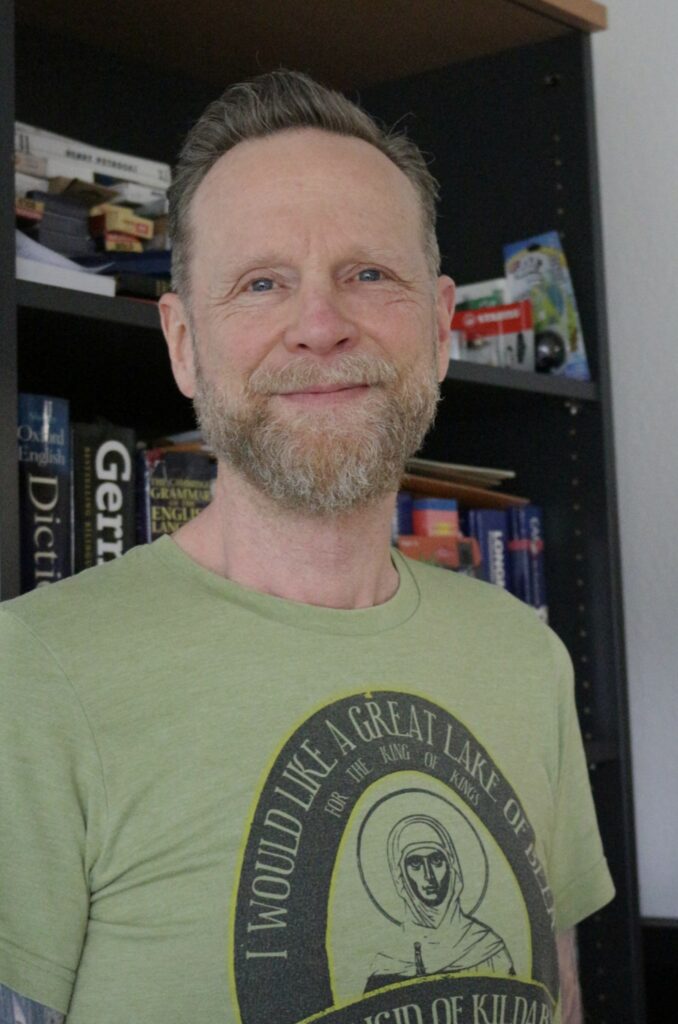Jeff Jay Stone, who teaches in the English Department at the University of Göttingen, has written multiple books throughout his lifetime, none of which have been published. How can personal interest in creative writing be integrated into one’s private and working life, and what are difficulties one can expect? In the interview, he openly explores the challenges he has faced during the writing and publishing process, provides insights into his routines, and talks about the sources of inspiration and dreams, that have driven his passion for writing and literature.
Interview by Sofia Peslis
Cover Picture: Via Pixabay, CC0
You have already written several books. How did you get into writing?
That depends on how you define writing. I started writing poetry and short stories as soon as I could write. Or even other stuff for music purposes. I recently found notebooks in my mother’s garage in the States, and I think my oldest notebook of writings dates from my middle school days – 1976, to be precise. I also have a notebook of songs from 1978 to about 1981, and there are lots of scraps folded into that notebook. My first digital one begins in 1983, so I was about 20. But I didn’t start writing as a kid, as some people do, maybe it’s my lack of creativity. There are people who are artists and that’s just what they are. They want to make art and it doesn’t matter to them how they do it to make a living or how much money they get paid. But there are different kinds of creative people, and I am just not the sort who wants to write all the time.
If it is not creativity, what fascinates you about writing?
Most heavy consumers of any art form want to participate themselves as something more than consumers. And I was, and remain, an exceptionally heavy reader, as it has always been my main source of pleasure and information – everything. I grew up without television in Taiwan, we didn’t even really have English television, so my entertainment program was reading. I would read anything – give me a dictionary and I would read it. So, what I find fascinating, as an active reader, are books, articles, simply words. And I wanted to be involved.
Let’s talk books: Can you tell us something about the books you wrote?
I wrote my first finished novel entirely by myself but on the basis of a basic plot line from a mentor and it was completed in the late 1980s. My mentor, who was going to get co-author credit, edited it down to less than 80 pages and submitted it to a dozen publishers, all who rejected it. My personal opinion is that my own version wasn’t good enough. I hadn’t learned how to write fiction yet, and his version was too short to be publishable.
You know, I hadn’t learned the craft yet. If you want to become good at anything, you have to learn the craft first, and you are not going to be good without it, unless you have some gift. Of course, people like that exist and, in that case, you only have to do your magic. But I think most writers are really just craftsmen with imaginations.
I began to write with intention, meaning, I was hoping to become a writer, while working freelance as an English teacher around 1997. I started notes on several projects, but all of these projects went on hold when my son was born in 1999 and I became a parent. From that point on, nearly all my work has been on non-fiction projects. The only one published is a modified version of my doctoral dissertation. So, my actual work to try and become a writer ended more or less in 2003.
But you finished a non-fiction novel – can you tell us something about the plot of the book?
My first bona fide novel based entirely on my own idea was supposed to be something like the first case of a character that I could run with for several books. I wasn’t being cynical, but I was trying to be practical, in that everything was calculated to be like a successful mystery novel that I myself enjoyed. So, I imagined a character and put him into a situation to see what he’d do. Once you have that much, a story writes itself. If the character is fully imagined, and the situation too, then you just have to put it all on paper. I did that, but never found an agent to help me find a publisher.
Where did you get your inspiration from?
I don’t have worlds in my head that I have invented. I don’t have the imagination. I think what I could have been good at would have been historical books, where I can craft pictures in your head about real historical events that have already happened. The pop fiction novels were only meant to get me a foot in the door anyway, because what I really wanted to write was history for a mainstream market. That’s what I mean when I say I don’t have a good imagination. I am not inventive. There are two kinds of people: some who have a story in their head to tell and then the craft is to get it on paper and to actually make it sound good and rich. The others are simply interacting with words and sentences. And I am that second kind. I am good at working with language and that comes from reading and being a naturally verbal person. I need a purpose or a cause to actually write something.
Where did you get the inspiration from for specifically this one?
The book I talked about before – my calculated “popular” mystery novel – was based on a dream I had in which there was a huge evangelical church in the US which had this weird kind of shopping-mall atmosphere, and there was this area where people were freely entering these tubes to kill themselves. I turned the whole thing into the existence of an underground suicide cult within a major, well-known urban evangelical mega-church, and had my character go investigate.
How did you experience the process of trying to publish something?
We are talking late 1990s. And back then we would have a book called The Writer’s Guide. You would get the annual edition, it was always updated, and in addition to articles that would help you actually write something, you could find a long list of publishers and agencies in it. Even though this guide also said that sending in things blindly was a lottery, it still gave you guidelines on how to do it, if you want to try. But the conventional wisdom was that the only people who get something published have an agency. So, I decided to go the agency route. I made a dozen copies, found as many agencies as I could, and send out the first two chapters. Most of them were rejections, I think I only had one person who said they actually liked it. The problem is that agencies want you to already be established, so this was the wrong way to go. Especially because I was living in Germany, trying to write English books. The best thing you could probably do is to be centrally located. So, you go live there, hang around the clubs where the writers are, visit readings, take some courses or workshops, start publishing in journals for free, and just throw your writing out there into the world. And then an agent might see you and you have a whole portfolio of your writings that you can show them. But well, I didn’t publish anything. In today’s day in age, I could probably throw these books online and try to self-publish them. I think the most important part is that you shouldn’t be shy about your work.
How do you combine creative writing with your work life?
Well, the answer is I don’t write anymore. And back then I didn’t really work, I worked freelance. Between getting settled down in Germany in 1995 and the birth of my son in 1999 was my most productive period. I finished one book, started its sequel, and was thinking about or actually writing notes for another four or five projects. That is probably also the only thing that I still do – writing notes. But these are just thoughts and ideas. If you really want a finished product, you can’t really do anything else. At least that’s how it works for me. I wrote my doctors dissertation by locking myself into a room, with a small bed and only came out to eat. I was living in my office. And then I spent the next year polishing it up. My main method of working with words is to throw everything onto the page. After that, I can trim it down or rearrange what I wrote.
Finally, do you have some advice for people who dream of becoming a writer?

Picture: © Sofia Peslis
I would say you have to have a portfolio and just start putting out your product. You need to try and publish anything you can and build that portfolio of things that you can be proud of. And on top of this, networking is the solution to anything. I am sure that you could by-pass it and pdf your way to success and it could happen for you. But generally, you need to be able to point people to what you are doing, even if it is over a blog or Instagram. So “dreaming” of becoming a writer might be a misguided dream anyway. We live in a culture where we tell everybody you can be whatever you want, but that’s not true and we know it is not. If you are a writer, you simply are one. But you have to find your own way, that’s the biggest part.
My fatherly advice would be: No one can take something away from you if you get your own pleasure out of doing it.






